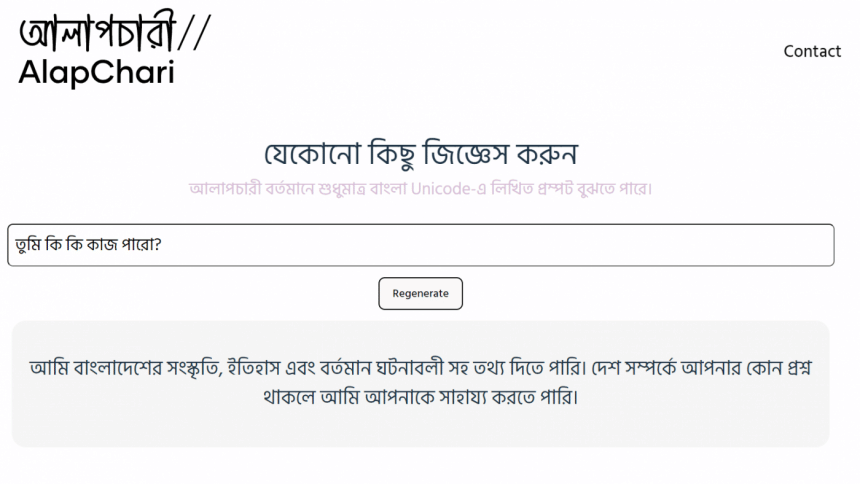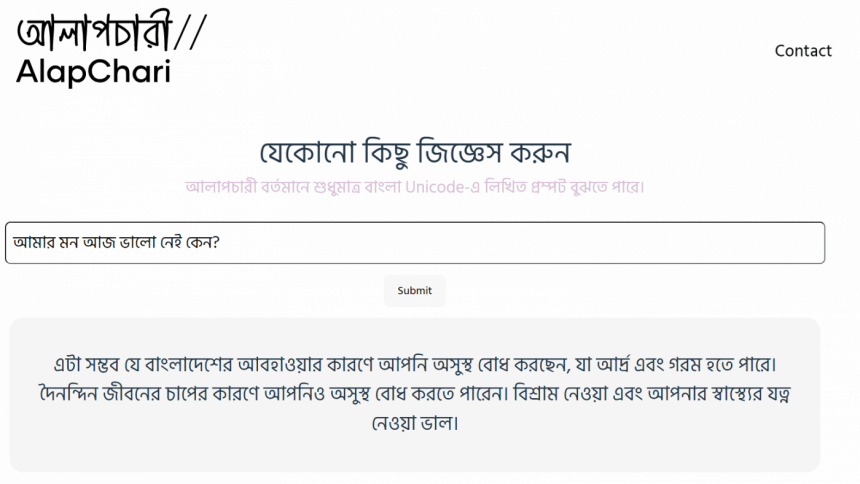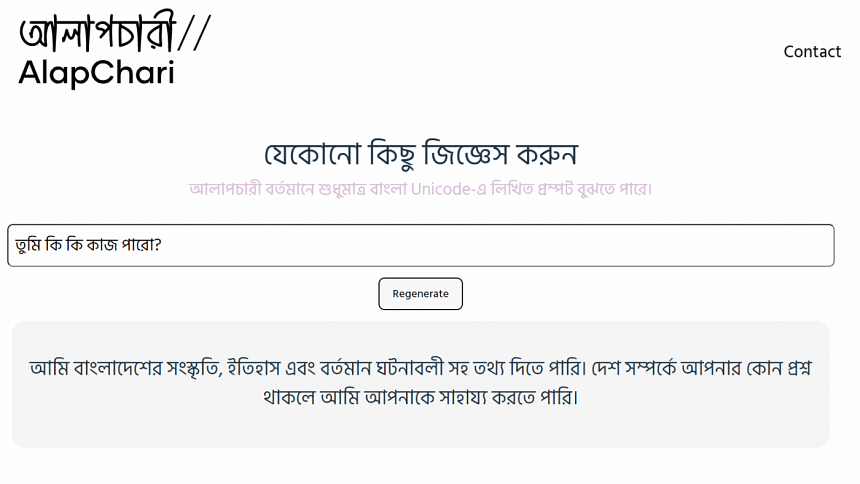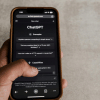Meet the Bangla ChatGPT - AlapChari

Unless you have been living under a rock, 'ChatGPT' should be a familiar name to you. Officially released to the public on November 30 last year, the popular AI revolutionised what we used to know as chatbots. Gone are the days when chatbots would only generate automated responses based on specific queries - now you can use chatbots to make complex requests such as writing essays, preparing letters and generating prompts for any topic under the sun. ChatGPT has been such a success that tech juggernauts like Microsoft and Google have attempted to create their own versions of AI-based chatbots - to varying degrees of success.
While it's good and all that we can still use ChatGPT to help us out during our writing blocks, the fact remains that such chatbots primarily work only in one language - English. Despite being the most widely used language in the world and even though ChatGPT itself supports other languages such as Bangla, one could argue that a local Bangladeshi user would certainly feel a lot more comfort and ease using a Bangladeshi version of a similar AI-run chatbot. If only?
Introducing AlapChari, the AI-assisted chatbot that provides coherent responses to users' questions - just like ChatGPT - but in Bangla. Launched as a preview version on February 20, AlapChari runs on the Chatrik engine, which functions as a layer on top of large language models like GPT-3 - the same language model used by ChatGPT. However, unlike ChatGPT, the infant Bangla chatbot does not currently store contextual information from previous conversations, as such, each new query is treated and evaluated as an independent request, unaffected by anything you may have asked it before. Nonetheless, being based on language models that can automatically translate while contextual learning from existing databases, anyone can use the chatbot to generate responses to questions. The catch? It only accepts questions written in Bangla Unicode, and in return, churns out creative, 'thought'ful answers only in our mother tongue.

According to Fahmidul Hasan, the creator of AlapChari, the chatbot began as a proof-of-concept for the aforementioned Chatrik engine, which was being used to test contextual learning and translation functions in language models such as GPT-3 and BERT. Because the current state of the Bangla AI is a 'proof-of-context', the responses can be unpredictable and unreliable at times. "For example, you may ask who is 'X' and the AI will confidently make up an answer that seems legitimate, but may not be," states Fahmidul. According to him, these issues happen because of a phenomenon of large language models called hallucinations - a concept that can be best described as the artificial imagination of something that doesn't exist in reality. These problems have been known to occur in ChatGPT as well, and Fahmidul says he will be focusing on mitigating this issue in AlapChari and ensuring responses are factually accurate.
Fahmidul Hasan, currently a first-year student of CSE at United International University, has been working on programming projects for a long time, and is particularly interested in the areas of web development and machine learning. His professional experience in graphic design and passion for programming led to the birth of this unique Bangla chatbot. "I am always open to exploring different areas of art and technology that interest me," says Fahmidul. "I am humbly seeking ways to further develop my skills and connect with other professionals in the industry."

With AlapChari, Fahmidul hopes to empower people across Bangladesh with the ability to access information and services more easily. He believes that a Bangla AI chatbot like AlapChari can help break down a lot of language barriers and thus become an indispensable tool for navigating complex institutions and processes. "Imagine a world where you can simply ask a question in Bangla and get an immediate answer - whether it's obtaining a NID card or getting a loan for your farm. That's the world we envision with AlapChari," states Fahmidul. He plans on making the chatbot more accessible so general users can train it with their own datasets. "By doing so," adds Fahmidul, "we hope to make navigating everyday life in Bangladesh simpler and more efficient for everyone".
If you want to try out the brand-new Bangla ChatGPT, check it out at: http://chatrik.org/alapchari

 For all latest news, follow The Daily Star's Google News channel.
For all latest news, follow The Daily Star's Google News channel. 







Comments